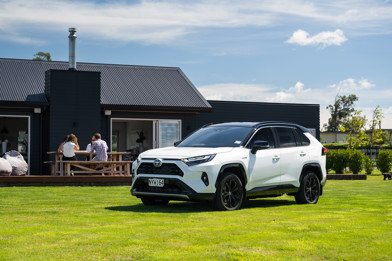New Zealand Ford Ranger customers have spoken with their chequebooks about Clean Car Discount/fees: they just don’t care.
As it launched the next-generation Ranger to media this week, Ford NZ was holding 5055 orders for the next-generation ute, 50 per cent of them powerful new V6 models: the turbo-diesel Sport and twin-turbo petrol Raptor, which attract Clean Car fines of $3910 right up to the maximum $5175.
That 5055 figure is equivalent to 40 percent of total Ranger sales last year. It’s more than Ford NZ can handle: order a V6 Sport (above, front) right now and you might it get it by Christmas; if you want a V6 Wildtrak (above, rear) or Raptor, you’ll have to wait until early 2023.
So Ranger buyers are not fazed with Government fines. But is Ford NZ, given it will have to start paying Clean Car Standard fees from January 2023, if it can’t meet average CO2 targets that become progressively tougher each year? Every new Ranger is in the “dirty” zone.
Clean Car Discount fines, remember, are aimed at vehicle buyers. They are paid based on the CO2 output of individual cars: purchase a 2.0-litre BiTurbo (BiT) Ranger and you’ll have to write a cheque to the Government for $1840 before you can register it.
View all Ford Ranger models on DRIVEN
The Clean Car Standard, coming into effect from January 2023, is different/additional and aimed at vehicle distributors. If they can’t meet average CO2 targets across the vehicles they sell, they have to pay big fines. For a company like Ford, whose biggest seller is the Ranger, that could present a huge problem.
Or not, according to Ford NZ managing director Simon Rutherford. He says the company is serious about achieving Clean Car compliance (it’s a global Ford directive), but also that Ranger will remain a “core” product in NZ because its emissions will be offset by other Ford models to come.
“We’re confident; we’ve got a plan,” says Rutherford. “Despite the V6 mix going up, we’re confident because we’ve done the homework out to 2031.
“The headline is that we will proportionally reduce on Ranger as we get some of the other products in, but it will still be our core vehicle. As we look to the future, we still expect it to continue to be our core product.”
Rutherford argues Ranger could still comfortably make up 60 per cent of Ford NZ volume under Clean Car Standard targets thanks to the likes of the Puma and Focus mild hybrids, and an Escape hybrid joining the PHEV model this year (the petrol-only Escape will be dropped).
From 2023 we’ll also see zero-emissions models like Mach-E (above) and the e-Transit, in both Custom and full-size models, which will help bring Ford NZ CO2 averages down.
It’s also well-known that the new Ranger platform is set up for electrification, although the company remains tight-lipped on when and where that will happen.
Rutherford still can’t say whether all of the above means Ford NZ can avoid putting Ranger prices up from next year in response to the Clean Car Standard.
“We don’t know to what degree the Clean Car Discount/fee is really going to impact the segment. We’d be stupid to think it wasn’t going to affect it, but [the situation] hasn’t settled enough between us, the supply constraints and our competitors to really see where that segment is going.
“What we know is that for the first couple of years, the slope of the [Clean Car Standard] curve isn’t too painful. But then it is.
“We’ve done the math. The balance is really, what else is coming? We believe that with our current plan, we’ll be carrying credits. It’s still a challenge in that 2025-26 period, but our position is that we’re serious about compliance. The important thing is that we have to deliver our other volumes.
“But for us and probably our competitors, as we cross the line into 2023, I would anticipate there will still be some pricing [change].”
The new Ranger has been launched in XL, XLT, Sport and Wildtrak variants, at prices from $46,990 to $80,490. A single-turbo diesel is standard on most workhorse 4x2 variants, but the 2.0-litre BiT is now the core powerplant for 4x4 models.
A new V6 turbo diesel is available in both the new Sport specification and the Wildtrack (which also retains a BiT option).
The halo Raptor model (above), with a 3.0-litre twin-turbo petrol V6, will be launched later in the year at $89,990. But the order book is open.





